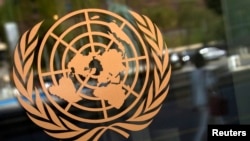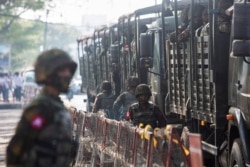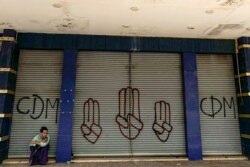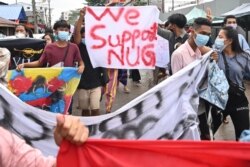Myanmar is awaiting a U.N. General Assembly decision that could play a role in who leads the country in the future. Myanmar is still grappling with the aftermath of a military coup that ousted the democratically elected government February 1.
At the 76th General Assembly session next week, Myanmar will be a hot topic, as the Credentials Committee, made up of nine countries, must recommend an entity to take the country's U.N. seat.
The choice comes down to either the military junta or representatives of the former government.
The military claims it ousted the ruling National League for Democracy because the party had ignored allegations that the general elections in November 2020 were riddled with fraud. The NLD had won the poll in a landslide, drubbing the military's proxy Union Solidarity and Development Party in a contest deemed mostly free and fair by local and international election observers.
NLD's ousted leader Aung San Suu Kyi and former President Win Myint have been detained since the coup and face several charges.
Meanwhile, a group called the National Unity Government (NUG), founded in the wake of the coup, claims to be Myanmar's legitimate government. It is made up of ousted politicians, leaders and pro-democracy activists, and the military deems it illegal.
In a crackdown on anti-coup protesters led by the civil disobedience movement (CDM), more than 1,000 people have been killed and thousands more detained, according to the Assistance Association for Political Prisoners, a nonprofit human rights group based in Thailand.
While signs of a possible civil war continue to increase, some prominent women activists are calling for international pressure on the junta.
Daw Ma Khin Lay, a former political activist and aid to Suu Kyi in the 1990s, left Myanmar following the coup.
Khin Lay is the director of Triangle Women Organization, a civil society group advocating for women's empowerment. Khin Lay maintains she is doing "what needs to be done" to eliminate military rule.
According to Khin Lay, there is a possibility the U.N. could recognize the NUG.
"We have to try many possible ways, diplomacy way, international pressure," Khin Lay said. "The credential is very important to get the recognition of the NUG and denounce the military. … Our desire is to reject the military. This is the best possible way."
In February, Kyaw Moe Tun, then Myanmar's representative to the U.N., appealed for the coup to end. He was subsequently fired by the military. It was later reported that New York authorities had arrested two people allegedly involved in a conspiracy to assassinate him.
Khin Lay added that although there are hopes for the NUG to be recognized, it is essential that the U.N. recognize Moe Tun.
"Credentials are very new for us. We have to learn," Khin Lay said. "According to ASEAN, there will be three possible options. (We believe) the most possible … is to recognize Moe Tun," she added. ASEAN is the Association of Southeast Asian Nations.
Thinzar Shunlei Yi is another prominent activist fighting for change in Myanmar. She is wanted by the military but managed to speak to VOA by phone in August.
The activist maintains that the coup is still regarded as a failure, as the CDM continues to stifle the junta's operations.
"Even after the killings, people still go on the streets and keep protesting, so the grounds are different," she said. "We still have many protests in different places, in different forms. On the street, digital platforms — so I feel the resistance is still going strong even after all these intimidations. … People still risk their life. That's the mindset of CDM people."
And the activist stressed there should be no confusion about whom the U.N. should recognize.
"For the recognition of NUG, I don't think it is a dilemma. These are not two political parties. This is clearly a military junta abusing power to grab power and take control of the civilian government. The U.N. community doesn't need to have that dilemma," she said.







